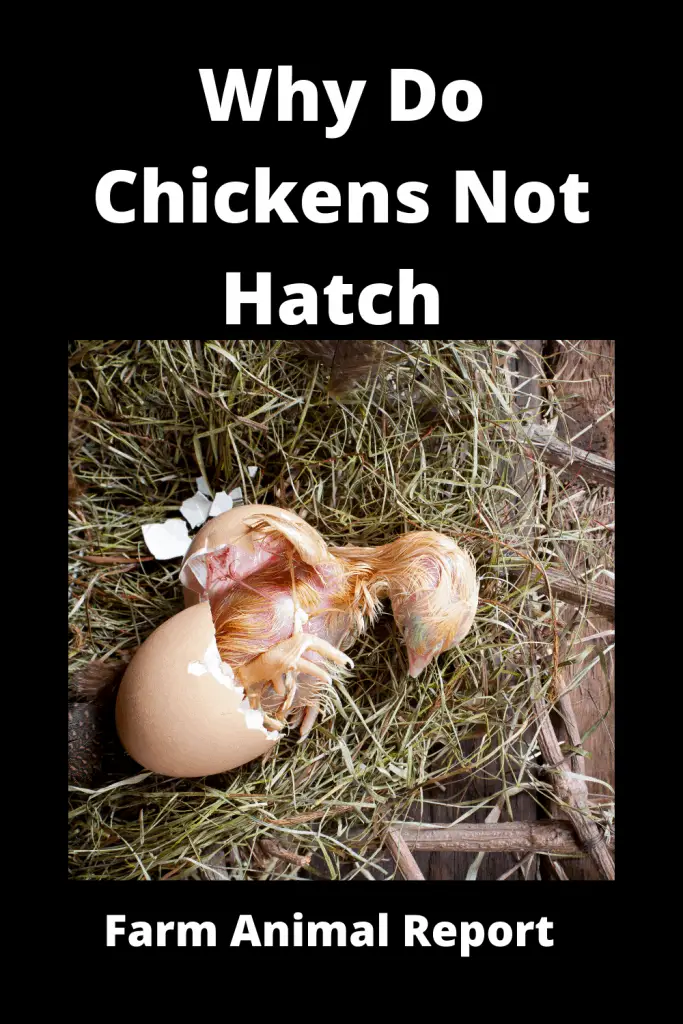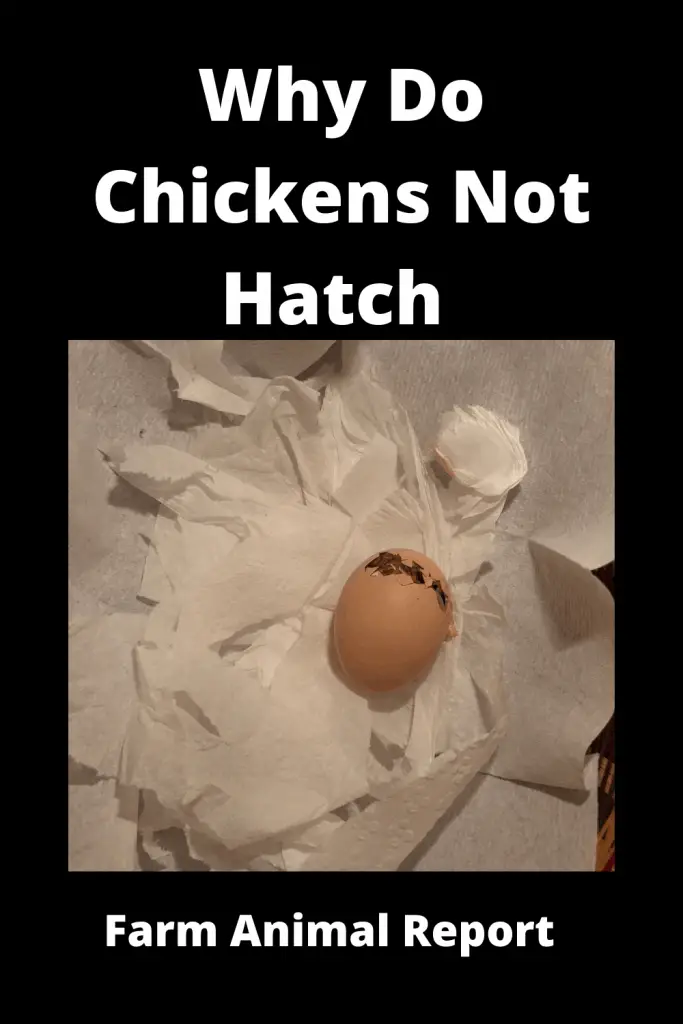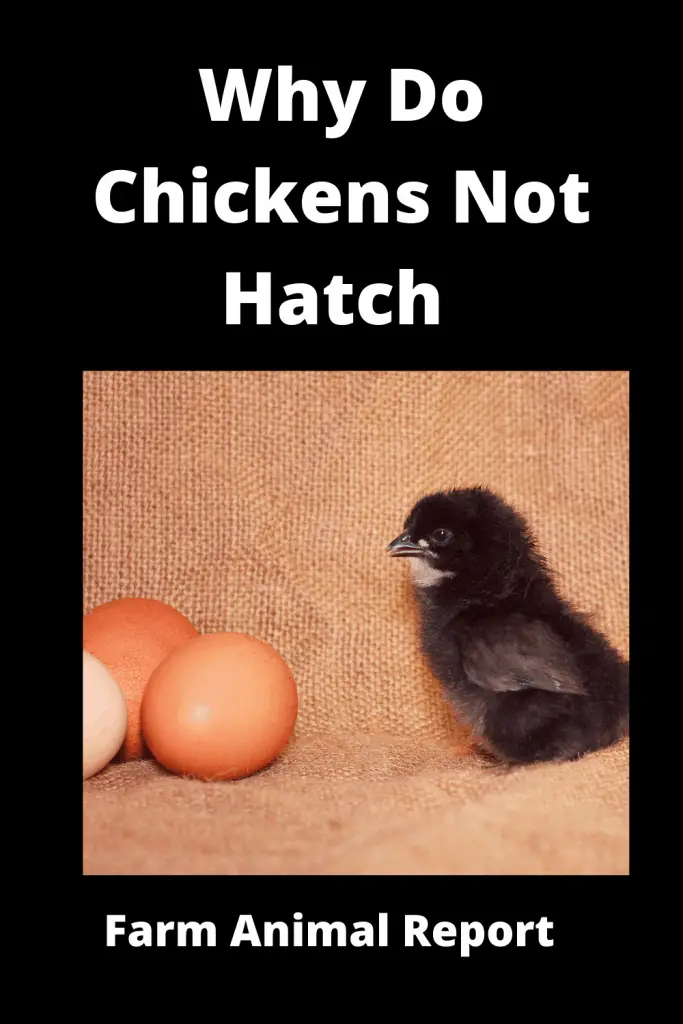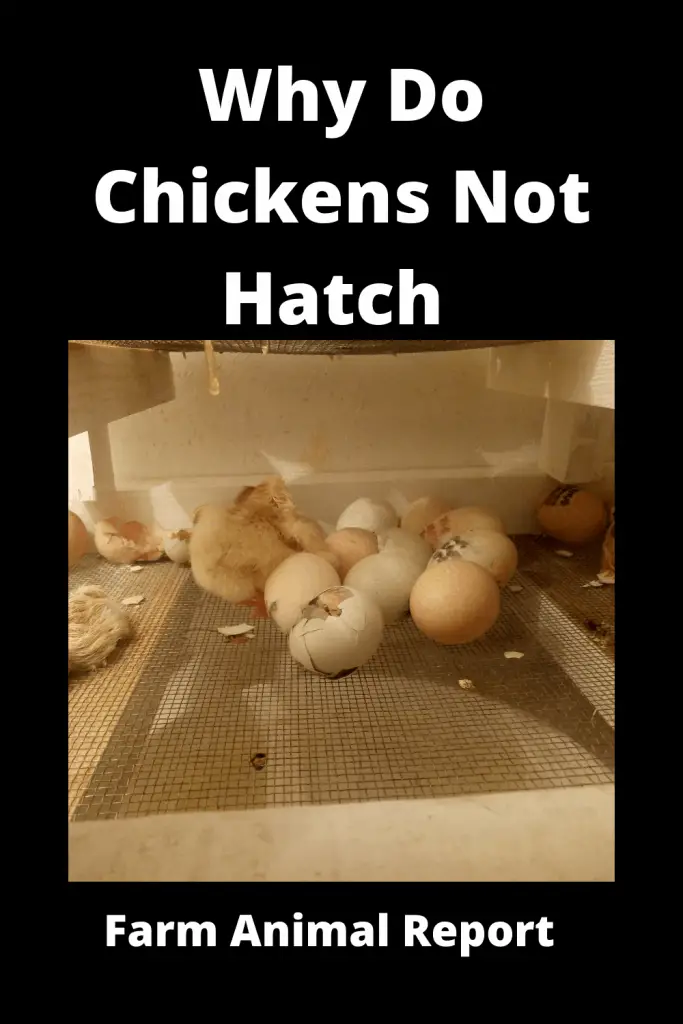As a general rule, unhatched eggs are from Egg problems, infertility, and a broody hen that does not sit or turn eggs. Parasite infestation can lead to that aggregation. Incorrect feeding and nutrients can affect the health of eggs. There are other reasons why not all eggs that have been fertilized will hatch, and this often has to do with a form of infertility, either from the rooster or the hen. Immature males or old roosters often have problems with their sperm, which leads to infertility problems.
Why Do Chickens Not Hatch
Why Do Chickens Not Hatch – Raising chickens could prove a profitable business and relatively less stressful than other farming businesses if you know how to do things well. Thus, if you plan on farming chickens for their eggs or meat, you need to learn how to properly look after your birds, and that includes creating the perfect atmosphere for them to hatch by constantly checking the incubator temperature for chicken eggs.
Family Sized Chicken Farm Egg Calculator
| Number of Chickens | Number of Eggs / Day | Number of Eggs / Week | Number of Eggs / Month | Number of Eggs / Year | Family Size | $ Value = .30 / Egg |
|---|---|---|---|---|---|---|
| 1 | .5 | 3.5 | 24 | 168 | 50.40 | |
| 2 | 1 | 7 | 28 | 336 | 1 | 100.80 |
| 3 | 1.5 | 10.5 | 42 | 504 | 151.20 | |
| 4 | 2 | 14 | 56 | 672 | 2 | 201.60 |
| 5 | 2.5 | 17.5 | 70 | 840 | 252.00 | |
| 6 | 3 | 21 | 84 | 1008 | 3 | 302.40 |
| 7 | 3.5 | 24.5 | 98 | 1176 | 352.80 | |
| 8 | 4 | 28 | 112 | 1344 | 4 | 403.20 |
| 9 | 4.5 | 31.5 | 126 | 1512 | 453.60 | |
| 10 | 5 | 35 | 140 | 1680 | 5 | 504.00 |
| 11 | 5.5 | 38.5 | 154 | 1848 | 554.40 | |
| 12 | 6 | 42 | 168 | 2016 | 6 | 604.80 |
| 13 | 6.5 | 45.5 | 182 | 2184 | 655.20 | |
| 14 | 7 | 49 | 196 | 2352 | 8 | 705.60 |
| 15 | 7.5 | 52.5 | 210 | 2520 | 756.00 | |
| 25 | 12.5 | 87.5 | 350 | 4200 | 1260.00 | |
| 50 | 25 | 175 | 700 | 8400 | 2520.00 | |
| 75 | 37.50 | 262.5 | 1050 | 12600 | 3780.00 | |
| 100 | 50 | 350 | 1400 | 16800 | 5040.00 |
Per Day / Per Week / Per Month / Per Year / Dollar Value
Rare Breed Chicken Farming
| Rare Breeds | Country of Origin | Eggs/Week | Average Weight | Price / Chicks |
|---|---|---|---|---|
| Black Penedesenca | Spain | 3-4 | 4-5lbs | $ 13.43 |
| Black Sumatra | Sumatra | 4 / Tinted in Color | 4lbs | $ 4.56 |
| Ameraucana | United States / Chile | 3 / 4 Blue | 5 lbs | $ 4.25 |
| Lavender Orpington | England | 4 / 5 Brown | 5 lbs | $ 6.08 |
| Partridge Chantecler | Canada | 3-5 / Brown | 7 lbs | |
| Wyandotte | United States | 3 - 5 / Tinted Brown | 6 lbs | $ 4.90 |
| Welsummer | Welsum Netherlands | 4 / Dark Brown | 5 lbs | $ 5.95 |
| Silver Grey Dorking | UK / Roman | 8 lbs | $ 5.95 | |
| Light Brahma | United States / China | Brown | 13 lbs | $ 4.90 |
| Silver Laced Cochin / Shanghai | China | 5-6 / Brown | 6 lbs | $ 4.90 |
| White Marans | Marans / France | 4 / Dark Brown | 5 lbs | $ 6.08 |
| Dominiques | United States | 4 - 5 / Brown | 7 lbs | $ 4.90 |
| Exchequer Leghorn | Tuscany Italy | White | 5 lbs | $ 4.25 |
| Silver Spangled Appenzeller Spitzhaubens | Switzerland | 5 | 4 lbs | |
| Buff Brahma Standard | Shanghai China | Brown | 13 lbs | $ 4.90 |
| Silver Laced Polish | Poland / Netherlands | 4-5 lbs | $ 5.95 | |
| White Sultan / Fowls of the Sultan | Turkey | 2 - 3 / White | 4-6 lbs | $ 7.75 |
| Mottled Houdan | Houdan Paris France | White | 4 - 5 lbs | $ 7.75 |
| Dong Tao / Dragon Chicken | Vietnam | 2/3 | $ 2500 - | |
| Ayam Cemani | Indonesia | 3 / Cream | 5 lbs | $ 50 - $ 2500 |
| Onagadori / Honorable Chicken | Japan | $ 49.00 | ||
| Polverara | Italy | 2 / 3 | ||
| Ixworth | Sussex UK | 4 / Cream | ||
| Naked Neck / Transylvanian Naked-Neck chickens. | Transylvania | 5 | $ 4.25 | |
| Campaign | Belgium | 7 / White | 5 lbs | $ 7.75 / Golden |
| Deathlayer / | German | 7 / White | $ 99.00 | |
| Serama / Smallest Chicken in the World | Thailand | .5 - 1 Lb | $ 39.00 | |
| Silkie / Silky | Chinese | 2 / Cream | $ 5.75 / White $ 5.75 / Blue $ 5.75 / Buff $ 5.75 / Black |
|
Why Do Chickens Not Hatch – However, the path to a successful business won’t be easy, especially if you don’t know too much about raising these birds and offering them a welcoming environment.
And, even when they do have everything they need, not all of them will hatch their eggs, giving birth to new chickens, which could be seen as a setback for your company. Let’s take a closer look at the incubation process and identify the reasons why some of the eggs remain unfertilized.

How are Cickens Born?
Depending on their size and breed, hens will start producing eggs at the age of 6-7 weeks. In almost all species of birds and animals, it requires both sexes to deliver a baby, and it is no different in the world of hens. However, chickens don’t actually need a male or a rooster to lay eggs.
12 Ways to Make Money by Chicken Farming—Extensive Guidelines for Chicken Farmers
They are capable of doing that on their own, but in order for an egg to be fertilized and produce a living offspring, the sperm of the rooster will be required. Without it, the eggs remain unfertilized and, therefore, won’t come to life.
Another interesting thing about chickens is that even when the eggs are fertilized, not all of them hatch.
Two Modes – Sitting / Laying
For an egg to have a chance of developing into a living form, it should remain at the exact temperature of 99 degrees Fahrenheit in the first 24 hours, and then to a similar temperature for 21 days, which is called the incubation period. Female chickens have two modes – the “laying eggs” mode and the “sitting on eggs” one. The bird will only switch from the first one to the other when her nest is full of eggs, which usually counts for about a dozen.
Hen Brooding
The second phase is called “brooding” and is the final one that will help eggs hatch. During the brooding period, the hen rarely leaves the incubator (nest) to eat, rest or stretch as she must keep the eggs warm enough for them to hatch. She also turns more protective and won’t leave anyone else near her nest.
However, chickens farmed artificially and on an industrial scale often lack the instinct of brooding as they are only needed to lay eggs and not to hatch them also. Thus, most of them will keep on laying eggs that won’t be fertilized with the help of a rooster as there is no need for him also.

Why Aren’t Store-Bought Eggs Hatching?
If you went to the supermarket and bought a dozen eggs in the hope of creating a mini-farm on your own, you will be disappointed to discover that they won’t hatch. The reason behind this is simple – hens don’t need a rooster to lay eggs, and, without him, the fertilization cannot take place.
Chickens keep on laying eggs that are easily picked up by farmers every morning and delivered to the stores where you are buying them from. And, even if there is a slight chance for the eggs you’re buying to have been fertilized by a rooster, they are stored in cool places, where temperatures aren’t near the 100 degrees Fahrenheit needed for them to be incubated.
In fact, not even your home will be close enough to this temperature to provide the right environment for the eggs to hatch, so that’s why you won’t be getting baby chickens anytime soon.
Why Fertile Eggs don’t Hatch?
If you thought things were complicated before, wait until you find out that not even all fertilized eggs turn into live chickens. The truth is that getting chickens out of fertilized eggs is more of a game of chance instead of exact science.
There are other reasons why not all eggs that have been fertilized will hatch, and this often has to do with a form of infertility, either from the rooster or the hen. Immature males or old roosters often have problems with their sperm, which leads to infertility problems. The same thing can happen to female chickens if they are too young or too old too. Another thing that might cause the eggs not to hatch has to do with overweight breeders, often enough males.
Incorrect feeding or not providing enough nutrients for your birds can also lead to fertility problems. Although resilient, chickens do suffer from certain diseases or get infested with mites or parasites which often leads to infertility. Last but not least, improper living conditions may also affect the rooster’s sperm quality, meaning there are fewer chances for eggs to hatch.

Not providing enough space for your chickens to roam freely might put additional pressure on them and cause stress. Similar effects are also seen when there are too many birds sharing a limited space or there are too many females sharing the same male chicken.
How to Prevent Fertility Problems
Although some eggs may “fail to launch” no matter how much you dedicate your spare time to looking after your flock, most of the infertility causes can be solved. Parasites and diseases can be easily treated if they are discovered in time, so make sure your birds get their regular check-ups and are seen by a veterinarian.
Proper feeding with high-quality and organic ingredients will also boost your chicks’ immune system and promote fertility. However, it is important to talk to a specialist or a vet before changing your birds’ diet to make sure it contains all the necessary vitamins and minerals for healthy growth.
Unsuccessful hatches can be caused by infertile eggs or embryo mortality. Each of these conditions can be diagnosed by Candling Eggs. It is important to examine eggs that do not hatch to estimate whether infertility or embryo death is the basis for hatch failure. Also spoiling infertile eggs and those containing dead embryos could contaminate viable eggs, thus decreasing hatching success.
Some Reasons for Poor Hatches
- Poor results in hatching are commonly caused by improper control of temperature or humidity. When the temperature or humidity is too high or too low for a long period of time, the normal growth and development of the embryo are affected.
- To obtain the best possible hatch, keep the temperature as near 100.5 degrees F. as possible for the entire incubation period in a still air incubator. There will be a fluctuation of two or three degrees above or below 100.5 degrees F., but there should not be prolonged periods of high or low temperatures. High temperature is especially serious.
- An incubator that is run warm, constantly averaging a bit above 100.5 degrees F will tend to produce an early hatch. One that is run cold, a bit below 100.5 degrees F will tend to produce a late hatch.
- To obtain the proper temperature reading, place the bulb of the thermometer so that it is on a level with the place where the embryos will begin to develop in the eggs. This is approximately 1/4 inch below the top surface of the shell when the egg is on its side. This applies to chicken, duck, pheasant, quail, and other species’ eggs. The bulb of the thermometer should not be in contact with an egg.
- Check the thermometer. Is it accurate? An error of one degree for 21 days can seriously interfere with embryonic growth.
- To check the incubator thermometer, place the bulb next to the bulb of a clinical (the oral kind used to check body temperature) or a laboratory thermometer. Hold under lukewarm tap water and compare the readings. Make an adjustment for any error in the incubator thermometer.
- A thermometer in which the mercury column is split will not give an accurate reading.
- Rarely is the humidity too high in a still-air incubator. Normally, it tends to below. Thus, the water pan should cover at least one-half of the surface area of the incubator.
- The humidity should be raised during the last three days of incubation. Adding another water pan or a wet sponge helps to do this. Embryos need considerable moisture to hatch properly and easily. High humidity tends to produce a late hatch; low humidity an early hatch.
- Do not turn the eggs in the last three days of incubation. The embryos are moving into hatching position and do not need to be turned. Keep the incubator closed to maintain proper temperature and humidity, but Do not seal it tight for the embryo needs oxygen.
- Don’t forget to place a cloth, crinoline is best, on the screen floor of the incubator. This protects the navel, the place where the abdomen closes after surrounding the remains of the yolk, from injury. It also makes cleaning the incubator easier. The longer eggs are held before setting, the lower the fertility will be. Try to set eggs before they are ten days old. At three weeks, the fertility will drop to zero.
- Allow the newly hatched chicks to dry out in the incubator until they fluff up. Then place them in a brooding unit
Solutions for Poor Hatch Rates
- Candle the eggs to assess fertility and condition
- Disinfect the incubator
- Verify the settings of the incubator, particularly the temperature
- Ensure that the incubator is placed in a stable environment. Ideally, incubators should be placed in a room where the temperature remains in the 70 s. However, most incubators (including the Mini Advance) can work with temperature variations from 60 – 80 degrees Fahrenheit. Hatchability may still occur at temperatures as low as 60 or as high as 90 degrees. However, if the temperature drops to below 60 or go above 90 degrees, no incubator would be able to maintain the correct temperature inside the unit to ensure hatching – this includes the expensive professional incubators. Incubators should be placed in an area where there is no direct sun exposure (sun rays hitting the unit will increase the “ambient” temperature immediately around – and therefore inside – the unit significantly; nor should the incubator be placed in an area with drafts (from windows, doors or air conditioning vents).
Chicks Nutritional Deficiencies / Death Rate
Depending on the degree of malnutrition, either death or physical symptoms will occur. Please refer to the below:
Vitamin A: Death at about 48 hours of incubation from failure to develop the circulatory system; abnormalities of kidneys, eyes, and skeleton
Vitamin D: Death at about 18 or 19 days of incubation, with malposition’s, soft bones, and with a defective upper beak prominent.
Vitamin E: Early death at about 84 to 96 hours of incubation, with hemorrhaging and circulatory failure (implicated with selenium).
Thiamin: High embryonic mortality during emergence but no obvious symptoms other than polyneuritis in those that survive.

Riboflavin (Vitamin B 2): Mortality peaks at 60 hours, 14 days, and 20 days of incubation, with peaks prominent early as the deficiency, become severe. Altered limb and beak development, dwarfism, and clubbing of down are defects expressed by the embryo.
Niacin: Embryo readily synthesizes sufficient niacin from tryptophan. Various bone and beak malformations occur when certain antagonists are administered during incubation.
Biotin: High death rate at 19 days to 21 days of incubation, parrot beak, chondrodystrophy, several skeletal deformities, and webbing between the toes.
Pantothenic acid: Deaths appear around 14 days of incubation, although marginal levels may delay problems until emergence.
Pyridoxine: Early embryonic mortality based on antivitamin use.
Folic acid: Mortality at about 20 days of incubation. The dead generally appear normal, but many have bent tibiotarsus (long leg bone), syndactyly (fused toes), and beak malformations.
Vitamin B 12: Mortality at about 20 days of incubation, with atrophy of legs, edema, hemorrhaging, fatty organs, and head between thighs malposition.
Manganese: Deaths peak prior to emergence. Chondrodystrophy, dwarfism, long bone shortening, head malformations, edema, and abnormal feathering are prominent.
Zinc: Deaths prior to emergence, and the appearance of rump lessness, depletion of the vertebral column, eyes underdeveloped, and limbs missing.
Iodine: Prolongation of hatching time, reduced thyroid size, and incomplete abdominal closure.
Iron: Low hematocrit; low blood hemoglobin; poor extra-embryonic circulation in candled eggs.
Analyzing the deaths of the Chicks you are trying to hatch can help you understand their feed nutrition needs, and also of the Roosters and Hens.
Chicken / Poultry Breeder Associations
| Rabbit Association | Location | Link |
|---|---|---|
| US Poultry & Egg Association | United States | USPA |
| American Poultry Association | California | APA |
| Ohio Poultry Association | Ohio | OPA |
| National Chicken Council | United States | NCC |
| British Poultry Council | United Kingdom | BPCE |
| Poultry Club of Great Britain | United Kingdom | PCGB |
| Association of Poultry Breeders in EU | Europe | AVEC |
| Australian Chicken Meat Federation Inc | Australia | ACMF |
| Australian Poultry Hub | Australia | Poultry Hub |


